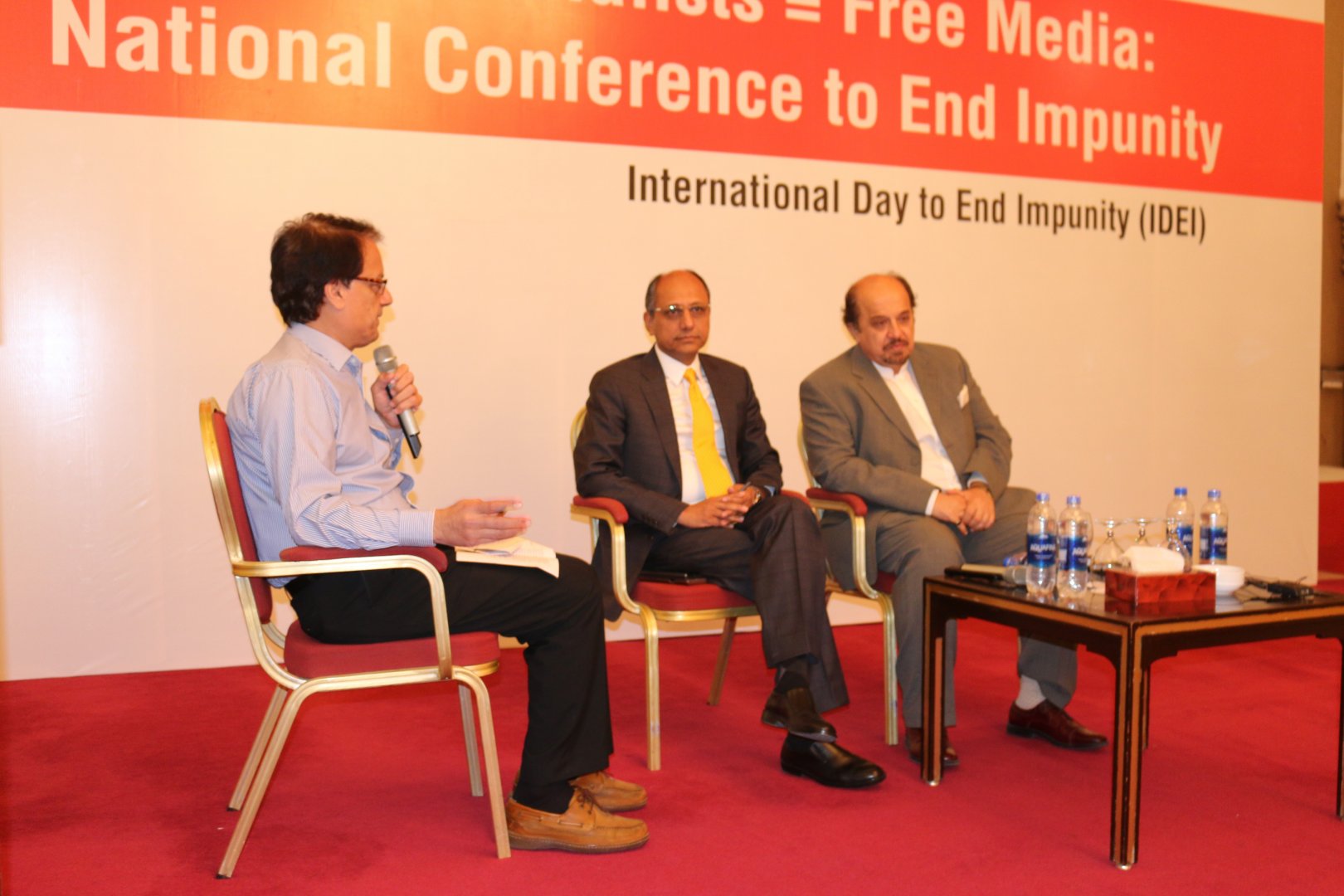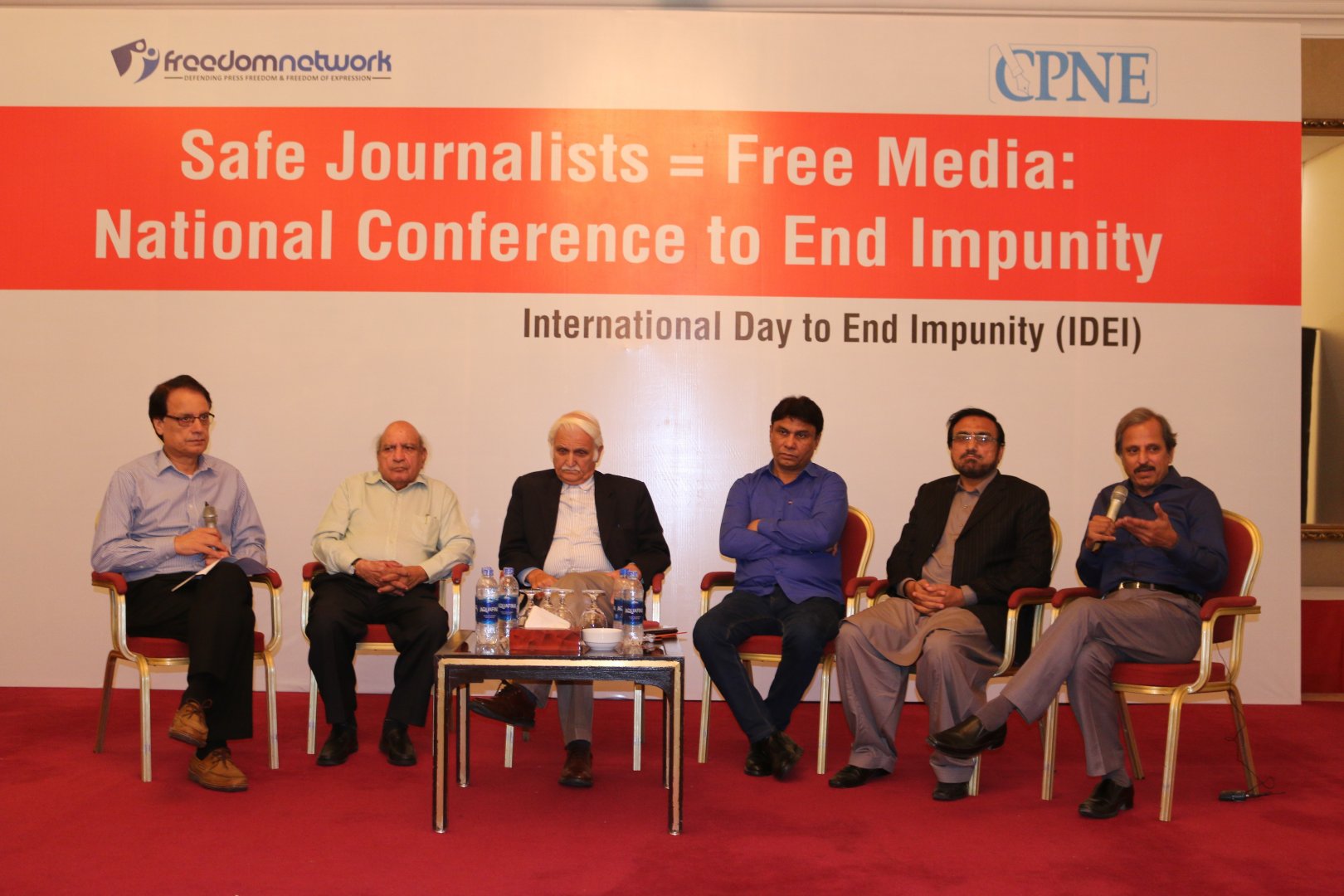
Protests for press freedom and the safety for journalists are seen in many parts of Pakistan. Here, a group of journalists took to the streets on 18 Dec 2019 after some of their colleagues were beaten for covering student protests in Srinagar, Kashmir. (Photo by Muzamil Mattoo/NurPhoto via Getty Images)
Media law reform
New promising law to end impunity for crimes against journalists in Pakistan
Pakistan is dearly in need of a law on journalists’ safety. Fortunately, progress is stirring.
In Pakistan, impunity for crimes against journalists remains firmly entrenched. Out of 33 cases of murdered journalists in the last six years, not a single perpetrator has been successfully convicted, according to a recent report from IMS partner organisation Freedom Network.
Impunity is deeply rooted in the country, which is still transitioning after a shift from military rule to democracy in 2008. The current depressing statistics of un-punished crimes against journalists deeply affect the future of press freedom and block developments towards an enabling environment for independent and professional journalism.
Fortunately, progress is stirring. In 2013, the federal government endorsed and approved theUN Plan of Action on the Safety of Journalists and the Issue of Impunity, and Pakistan became a pilot country for the implementation of the plan. International media rights and support groups joined hands with the country’s media stakeholders to fight back on impunity.
The issue of safety for journalists became a national agenda point, and the aim was to get a special law in place to hold those to account who commit crimes against journalists. The law, developed in collaboration by the different stakeholders, entails appointment of a special public prosecutor and a journalists’ protection council which should be accountable to the Parliament instead of the government on an annual basis.
Commitment from Sindh Government
On 12 November 2019, the law finally saw public commitment from government officials. At a national conference to end impunity for crimes against journalists, the Sindh Minster for Information and Broadcasting Mr Saeed Ghani made history with his announcement that he was “99% sure that it [the law on journalists’ safety] will be passed by the Sindh Assembly. I don’t think there’s any issue in that.”

The conference was a collaboration between Freedom Network, Council of Pakistan Newspaper Editors (CPNE) and International Media Support, created especially for this purpose: to begin to convince the political governments in Pakistan’s four provinces to take practical steps for protection of journalists, media workers and media houses.
His commitment was the first step in the country’s legislative process towards a legal framework for the protecting of journalists and press freedom. The second step will include marathon meetings between stakeholders and the Sindh government’s ministers and officials to reach a consensus document before the Sindh Assembly takes it up for debate and final approval. Though there is still a long way to go, the outcome of the conference could make the Sindh province the first area of Pakistan with a legal framework to support safety for journalists, and hopefully, the other provinces will follow.

0% justice for journalists
Pakistan is in dire need for legislation of this kind. A recent Freedom Network report, “100% Impunity for Killers, 0% Justice for Pakistan’s 33 Murdered Journalists in 2013-19” presents about horrifying statistics for impunity for crimes against journalists. “At least 33 journalists were murdered for their journalism work in Pakistan during the last six years, including seven in the past one year, but none of them received justice. Not a single one of their killers were punished, and this indicates the total impunity from punishment enjoyed by predators of journalists.”
Furthermore, the report states that in the case of the 33 murders committed against journalists during the past six years, the courts only declared 20 fit for trial. In only six of these, the prosecution and trial were completed. Of these six cases, only one saw the actual conviction of a killer. He then went on to escape punishment after successfully overturning the conviction at the appeal stage after which the family of the murdered journalist abandoned its pursuit for justice for lack of resources.
Collaboration and opportunity
I had hoped Pakistan would be the first country in Asia to have launched its own National Action Plan to protect journalists and end impunity. The Philippines became the first country in Asia to celebrate the launch of a National Action Plan on 22 November 2019 in Manila with full support from IMS.
Hopefully, Pakistan will continue on the way to follow their lead. The institutional partnership between Freedom Network and Council of Pakistan Newspaper Editors has been key highlight of 2019, and both organisations have agreed to work together to make the dream of special legislation in Sindh and elsewhere a reality. The partnership between the two organizations entails a two-point agenda – safety of journalists and defending freedom of expression.
We must not let this opportunity slip out of our hands. We must come together and cross that bridge without any further delays, as we lost many good journalists for which we are still seeking justice.




